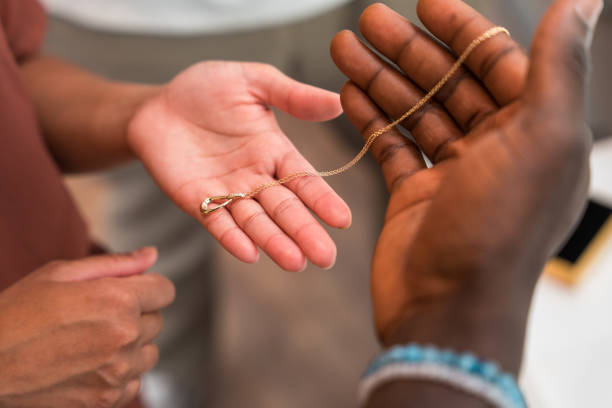(ThyBlackMan.com) You find a book on your nightstand—one you mentioned in passing weeks ago. No note, no special occasion. Just there. It’s the kind of gesture that lingers, not because of what it is, but because of what it means. Gifts like these speak quietly but clearly: I noticed. I remembered. I care. They hold emotion in their timing and intention, often saying more than a well-worded message ever could.
In modern relationships, gift-giving has become its own form of communication. A wrapped box, a shared link, even a coffee left on the counter can express care and attention. These small gestures offer a window into connection—how two people notice each other, offer support, and stay actively involved in one another’s lives.

Small Things That Stay: How Accessories Reflect Everyday Intimacy
Jewelry is more than just decoration. Items like small studs or charm bracelets often represent emotional connections between partners. These small pieces often carry personal meaning and reflect shared memories. Thoughtfully designed collections from makers like CordsClub lean into that idea—creating jewelry meant for everyday wear, so partners can feel close even when they’re apart.
A gift like that shows thoughtfulness that goes deeper than looks. It tells the other person they’re truly seen and appreciated—like when someone remembers a tiny detail you mentioned months ago and turns it into a charm or pendant. A keepsake like this can bring partners closer, marking those little everyday moments that shape their relationship.
Gift Timing as Communication
When a gift is given can matter more than how much it costs. A surprise gift on an ordinary Tuesday—like leaving a handwritten note with their morning coffee—can say “I care” more clearly than a birthday present. These little surprises during regular days can make someone feel really special.
Giving a gift after a disagreement or before a big moment shows support and empathy. These well-timed gestures can ease tension and help the relationship grow. If you want a gift to really matter, think about the moment it’s given—that alone can make it more meaningful.
The Rise of Co-Shopping and Soft Negotiation
In many modern relationships, partners are starting to shop for gifts together. Sharing screenshots or wishlists turns gift-giving into a shared task—like sending links through text or saving items in a shared folder. This teamwork helps both people feel included and lets gifts reflect what both actually like.
Shopping online together leads to helpful conversations. It brings out preferences that might not have come up otherwise. When both people are involved, the gift becomes more than a surprise—it becomes a shared expression of love. Looking at each other’s wishlists opens up an honest talk about likes and wants, helping with communication.
Sentiment Without Grand Gestures
Simple, thoughtful gifts are becoming more appreciated in relationships today. Things like a favorite snack or a book with a sweet note can say a lot without being flashy. Even picking up their go-to drink from a specific coffee shop shows you’re thinking of them. These kinds of gifts remind someone they’re being thought of and bring a sense of comfort.
Giving meaningful small items over time builds a strong emotional history between partners. These little tokens often come with stories and feelings attached—like a movie stub tucked in a wallet or a note slipped into a book. Keeping it simple but thoughtful helps partners feel connected in a low-key but powerful way.
Emotional Labor and Who Does the Buying
The way gifts are handled can reveal how emotional effort is divided in a relationship. Often, one partner is the one who remembers birthdays, favorite things, and gift ideas—even saving notes in their phone or keeping a list in a drawer. The other might forget or not think about it much, which can create tension.
When someone’s effort goes unnoticed, they might feel taken for granted. This can lead to frustration and emotional distance. Talking openly about gift-giving habits can help. It’s worth setting up a simple way to remember dates or plan gifts together. That can help share the load more evenly and keep both people feeling appreciated.
Gift-giving isn’t about price tags or perfection—it’s about presence, attention, and shared meaning. A small charm, a scribbled note, or their favorite snack can quietly say, “I see you.” These gestures don’t need a holiday or big reveal to matter. They carry weight because they come from paying attention. When both people stay involved—whether sharing wishlists or simply talking about what makes them feel thought of—the connection deepens. It’s not about getting it right every time. What lasts is the effort to stay emotionally present. Maybe that’s the point: love often lives in the little things we choose to notice.
Staff Writer; Joey Brown

















Leave a Reply